World
India Confirms Halt in Offensive, Reopens 32 Posts After India-Pakistan Ceasefire
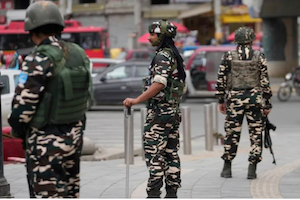
After days of intense clashes, India and its longtime rival Pakistan reached a ceasefire agreement on the 10th, though the international community remains skeptical. On the 12th, India stated that both sides had experienced "the first calm night in recent days," and announced the reopening of 32 airports. Military leaders from both countries are scheduled to meet on the 12th to discuss follow-up actions.
Last week, both sides exchanged missiles, drones, and artillery fire over a four-day period, resulting in at least 60 deaths and forcing thousands to flee their homes. The border town of Poonch, in the Indian-controlled Kashmir region, suffered the heaviest damage, with at least 12 residents killed. It is estimated that the majority of the town's 60,000 residents have fled. Although a ceasefire agreement has been reached, both India and Pakistan accused each other of violations after U.S. President Trump announced the news on social media, further fueling doubts about the truce.
The military leaders of India and Pakistan are set to meet on the 12th to discuss next steps. India’s civil aviation operations are gradually resuming, while Pakistan had already fully reopened its airspace on the 10th—signs that tensions may be easing. However, whether the two sides can maintain peace remains to be seen.
- 27 reads
Europe Threatens More Sanctions as Putin Calls for Ukraine Talks on May 15
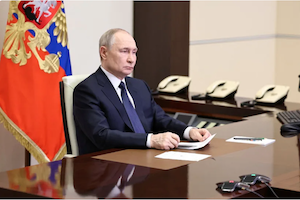
Putin Proposes Direct, Unconditional Talks with Ukraine on May 15; Europe Threatens More Sanctions Without Ceasefire
On May 11, Russian President Vladimir Putin proposed holding direct, "unconditional" talks with Ukraine to end the war that has dragged on for more than three years. Ukrainian President Volodymyr Zelensky responded cautiously, calling it a "positive signal" and stating that Kyiv is open to dialogue—but only if Russia agrees to a ceasefire first.
On May 10, European leaders issued a joint statement demanding that Russia implement an unconditional 30-day ceasefire starting Monday (May 12), warning that failure to comply would result in broader economic sanctions from Europe and the United States. Putin, however, did not respond to the ceasefire demand. Instead, he said he was willing to hold direct talks with Ukraine on Thursday (May 15) in Turkey. Many observers interpreted this sudden public call as a possible attempt by Russia to delay action and avoid new sanctions.
Europe's response was firm. Leaders made it clear that negotiations cannot resume without a ceasefire. German Chancellor Merz stated, "Negotiations cannot begin while the guns are still firing." Polish Prime Minister Donald Tusk said the international community is still waiting for Russia to make the right decision on an "immediate and unconditional ceasefire." UK Prime Minister Keir Starmer echoed this sentiment: "Together with the United States, we demand that Putin—if he is serious about peace—must show that commitment immediately."
Putin claimed that it was Kyiv, not Russia, that violated the 2022 agreement. Nevertheless, he said, "We propose to resume direct dialogue with Kyiv without any preconditions. We are willing to restart negotiations on Thursday in Istanbul." Despite the offer, Putin continued to accuse Ukraine of being the party responsible for the collapse of ceasefire talks.
U.S. President Donald Trump also weighed in on May 11, expressing doubt that Ukraine would actually reach an agreement with Putin. He urged Zelensky to accept the meeting, emphasizing that only by participating in talks can it be determined whether an agreement is possible. He added that the U.S. and its allies could then respond accordingly to help end the "bloody massacre" as soon as possible.
Following Trump’s statement, Zelensky quickly posted that he would personally attend the talks on May 15 and would wait for Putin in Turkey. However, he reiterated, “The first step to ending the war is a ceasefire,” and expressed hope that Russia would not find another excuse to back out. If the meeting takes place, it will mark the first direct talks between the leaders of Russia and Ukraine since the war began.
- 27 reads
India-Pakistan Tensions Escalate as G7 Urges Maximum Restraint and Direct Dialogue
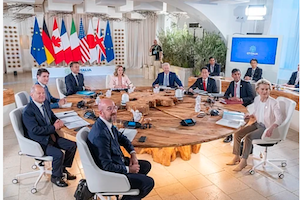
On May 10, 2025, tensions between India and Pakistan escalated sharply, leading to the most serious military standoff since the Kargil War in 1999. The Group of Seven (G7) industrialized nations issued a statement on Friday urging both countries to exercise maximum restraint and engage in direct dialogue to ease the conflict.
The confrontation was triggered by a terrorist attack on April 22 in Indian-administered Kashmir, which killed 26 Hindu pilgrims. India accused the Pakistan-backed militant group "The Resistance Front" of orchestrating the attack. In retaliation, India launched "Operation Sindoor" on May 7, a missile strike targeting terrorist bases inside Pakistan. Pakistan denied involvement and responded on May 10 with a retaliatory military operation named "Operation Bunyan Ul Marsoos," striking Indian military installations.
So far, the crossfire has claimed at least 48 lives and injured dozens more. Multiple cities in India have issued red alerts, while Pakistan has suspended all domestic flights. Both sides have mobilized troops and reinforced their border defenses.
In its statement, the G7 strongly condemned the April 22 terrorist attack and called on both India and Pakistan to exercise maximum restraint and avoid further escalation. U.S. Secretary of State Marco Rubio expressed willingness to assist in facilitating “constructive dialogue” between the two nations. However, U.S. Vice President JD Vance commented that the conflict is “not our concern.” United Nations Secretary-General António Guterres also voiced “deep concern” and reiterated the UN’s willingness to mediate.
The Kashmir region has long been a flashpoint between India and Pakistan, with both countries claiming sovereignty over it. The current escalation poses a serious threat to regional stability. The international community widely fears that continued conflict could lead to a larger-scale war, potentially involving nuclear weapons.
At present, there are no clear signs of de-escalation. The international community continues to monitor developments closely and urges both sides to resolve their disputes through dialogue to prevent further military confrontation.
- 39 reads
Vatican Elects First American Pope, Takes the Name Leo XIV
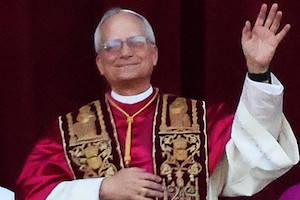
The Vatican began the papal conclave on the 7th, and after three rounds of voting, white smoke emerged from the chimney of the Sistine Chapel on the afternoon of the 8th. Out of 133 cardinals, 69-year-old American Cardinal Robert Prevost was elected as the 267th pope of the Catholic Church, taking the papal name **Pope Leo XIV**. At that moment, the bells of St. Peter's Basilica rang out, and the crowd in St. Peter's Square erupted in enthusiastic applause.
Pope Leo XIV was born in Chicago and served for many years as a missionary in Peru. From 2015 to 2023, he was the Bishop of Chiclayo, Peru. He holds dual citizenship in the United States and Peru and is a member of the Augustinian Order. He spent one-third of his life in the U.S., with the rest primarily in Europe and Latin America.
Leo XIV is fluent in English, Spanish, Italian, French, and Portuguese, and can also read Latin and German. Despite his linguistic talents, he is known for his reserved personality and conservative style. He is quiet and speaks little, expressing himself with caution and thoughtful consideration. He is a good listener and is regarded as a calm and efficient administrator.
After his election, Pope Leo XIV donned the red mozzetta and, for the first time as pope, addressed the crowd from the central balcony of St. Peter's Basilica. He began with the words “Peace be with you,” and greeted the crowd with a wave, delivering his entire speech in Italian and Spanish. He paid tribute to his predecessor, Pope Francis, thanked the cardinals for their trust and support, and acknowledged the Peruvian diocese where he had served for many years. Pope Leo XIV also outlined his vision for the future of the Catholic Church, calling for global peace and dialogue, aiming to make the Church a bridge-builder and a voice of compassion and care, working toward peace for all.
- Read more
- 30 reads
India-Pakistan Conflict Disrupts Civilian Flights; Pakistani Defense Minister Urges U.S. to Help De-escalate Tensions
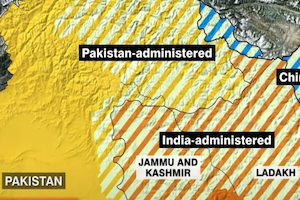
Tensions between India and Pakistan escalated on the 7th, with India launching "Operation Sindoor," conducting airstrikes on Pakistan and Pakistan-administered Kashmir. Pakistan, citing posts on social media, claimed it had shot down five Indian fighter jets and one drone, a claim India has denied. Dozens of civilian casualties were reported on both sides.
Initially, Pakistani aviation authorities maintained that the country’s airspace remained open and that “civil aviation activities were being conducted safely.” However, on the morning of the 8th, authorities abruptly closed four major airports—Islamabad, Karachi, Lahore, and Sialkot—citing "operational" reasons. The situation in the so-called "powder keg of South Asia" appears to be heating up.
The flare-up in the conflict was triggered by a terrorist attack on February 22 in Indian-controlled Kashmir, where militants from the “Kashmir Resistance” killed 26 Indian tourists. It was the deadliest such attack in nearly 20 years. India blamed Pakistan, accusing it of harboring and supporting militant groups, and subsequently suspended participation in a water-sharing treaty. On the 7th, India launched airstrikes targeting the infrastructure of terrorist organizations.
Satellite imagery showed a mosque in Bahawalpur, a city in Pakistan’s Punjab province, had been destroyed. India considers Bahawalpur a major hub for the Islamist group Jaish-e-Mohammed (JEM), which is active in Kashmir, and the mosque was believed to be one of the group’s training centers.
The international community has called for restraint from both countries. Pakistani Defense Minister Khawaja Muhammad Asif said in an interview that Pakistan does not initiate attacks on India but will respond if attacked. He added that if India takes a step back, Pakistan will also de-escalate. He praised former U.S. President Donald Trump and called on the United States to help resolve the conflict between India and Pakistan.
- Read more
- 26 reads
EU Urges U.S. to Restore Fair Competition Environment; Will Launch Retaliatory Measures if Tariff Talks Fail
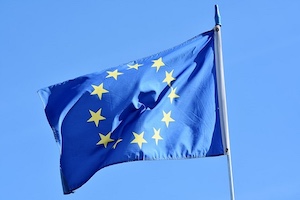
European Commission Vice President for Trade Maroš Šefčovič stated on May 6 that the European Union will not accept an unfair deal from the United States under pressure. If the two sides fail to reach a consensus through negotiations, the EU will defend its interests and implement balancing measures. This signals that the EU is prepared with contingency plans in response to a potentially uncompromising U.S. stance. According to *Bloomberg*, if negotiations fail, the EU may be ready with a €100 billion retaliation list.
Currently, the U.S. imposes a 25% tariff on EU imports of steel, aluminum, and automobiles. Most other goods are subject to a "reciprocal tariff" of 10%, which is set to increase to 20% after a 90-day grace period. More than 70% of EU exports to the U.S.—worth around €380 billion—are already affected. If additional categories such as pharmaceuticals and semiconductors are included, this could cover over 97% of goods, totaling approximately €549 billion. The total value of tariffs imposed could reach €100 billion. In comparison, U.S. tariffs on EU goods in 2024 were only €7 billion.
Šefčovič asserted that the EU is not backing down, noting that it is actively negotiating free trade agreements with Asian countries including India, Indonesia, the Philippines, Thailand, and Malaysia. "All countries want to accelerate their agreements with the EU," he said. He also mentioned that the EU has established a task force to monitor "trade diversion effects" caused by U.S. tariffs, with a report expected in mid-May.
So far, the EU has not taken retaliatory actions against the U.S., but has publicly threatened to impose tariffs worth \$21 billion on U.S. goods in response to the 25% tariffs on steel, aluminum, and automobiles imposed by the Trump administration. Šefčovič emphasized that the EU continues to show sincerity in resolving the dispute, such as proposing that both sides reduce import tariffs to zero across the board—including for strategic industries like automobiles; work together to address global overcapacity issues in sectors such as steel and aluminum; and jointly enhance the resilience of the transatlantic supply chains for semiconductors, pharmaceuticals, and other industries. He urged the U.S. to pursue a fair and balanced solution, warning that “we are ready with alternatives to restore a fair competitive environment” if not.
- Read more
- 34 reads
U.S.-Japan Tariff Negotiations Reach Impasse as Japan’s Request for Exemption Is Rejected
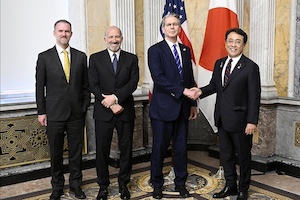
The Trump administration in the United States has announced a 10% reciprocal tariff on all imported goods, with an additional 14% imposed specifically on Japanese imports. Despite Japan’s active push for an exemption, the U.S.-Japan tariff negotiations have reached a stalemate, with the U.S. refusing to make any concessions.
According to Japan’s Kyodo News, the second round of cabinet-level tariff negotiations between the U.S. and Japan was held on May 2 at the U.S. Department of the Treasury and lasted two hours. The U.S. was represented by Treasury Secretary Scott Bessent and Trade Representative Jamieson Greer, while Japan was represented by Economic Revitalization Minister Ryosei Akazawa.
After two rounds of talks, the U.S. explicitly rejected Japan’s request to negotiate an exemption from the 10% reciprocal tariff. Tariffs on automobiles and steel were excluded from the negotiations. The U.S. only agreed to negotiate the possibility of postponing the additional 14% tariff until July 9. However, this tariff would not be reduced to zero—only a potential reduction or an extension of the grace period would be considered.
Additionally, on April 2, the Trump administration officially announced its tariff policy, imposing a 10% tariff on all imported goods from all countries and regions. Higher rates were imposed on countries deemed to levy high tariffs on U.S. goods—China at 34%, South Korea at 25%, Japan at 24%, the European Union at 20%, and Taiwan at 32%. The policy took effect at midnight on April 9, Eastern Time. However, Trump later announced a 90-day suspension of full implementation, citing that over 75 countries had sought negotiations and refrained from retaliatory measures. During this period, only the 10% tariff would be applied.
- 31 reads
Trump Denies Bid for Third Term, Names Vance or Rubio as Potential Successor
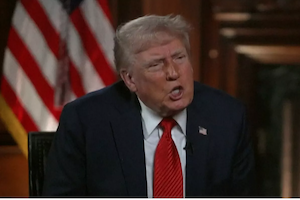
In an interview with NBC’s Meet the Press on May 4, U.S. President Donald Trump stated he does not intend to seek a third presidential term, acknowledging for the first time that such a move would violate the 22nd Amendment of the Constitution. He hinted that Vice President J.D. Vance or Secretary of State Marco Rubio could be ideal successors, while downplaying speculation about 2028 campaign merchandise and expressing uncertainty about the constitutional term limit's legitimacy.
In addition to softening his tone on the re-election issue, Trump has also shifted on personnel matters. He adopted a more restrained stance toward Federal Reserve Chair Jerome Powell, stating he would not replace him before his term ends in 2026. On foreign policy, however, Trump remained assertive, expressing continued interest in acquiring Greenland—even hinting at potential military action—and reiterating his hope for Canada to become the 51st U.S. state.
On U.S.-China trade, Trump made a rare statement suggesting that tariffs on Chinese goods might be lowered in the future to preserve bilateral commerce. While stressing China’s current economic struggles, he said he remains open to a fair trade deal, and noted he would not be speaking with Chinese President Xi Jinping this week.
- 43 reads
Albanese Becomes Australia's First Re-Elected PM in 20 Years as Labor Pulls Off Dramatic Comeback Victory
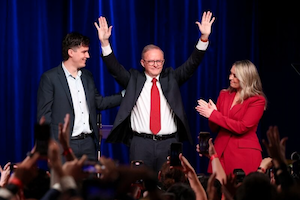
Australia held its federal election on the 3rd, with incumbent Prime Minister Anthony Albanese leading the ruling Labor Party to re-election victory, making him the first Australian prime minister in over two decades to win a consecutive term. According to projections by the Australian Broadcasting Corporation (ABC), Labor is expected to increase its seats in the 150-member House of Representatives from 77 to at least 85—surpassing the majority threshold and securing stable governance.
Analysts suggest that former U.S. President Donald Trump's aggressive tariff policies and the resulting market instability made Australian voters uneasy, leading them to favor the current government. During the campaign, Albanese took a firm stance against Trump’s trade policies and attempted to brand the opposition Liberal Party as pro-Trump—possibly a key factor in Labor’s dramatic turnaround.
Liberal-National coalition candidate Peter Dutton echoed Trump-like policies on reducing immigration and cutting public sector jobs but failed to gain enough voter support. Albanese’s campaign strategy successfully appealed to centrist voters, allowing Labor to overcome months of lagging in the polls and ultimately secure a decisive victory just weeks before the election.
This election marks not only a significant turning point in Australian politics but also highlights the influence of global affairs on voter decision-making. In his second term, Albanese will continue to face economic challenges, particularly the impact of U.S. tariff policies on Australia’s economy.
- 56 reads
Germany's New Chancellor Faces Doubt: 56% Lack Confidence in Merz
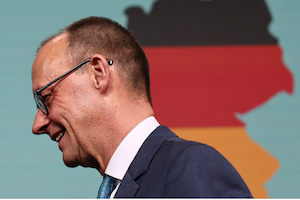
According to recent reports from multiple media outlets, Germany's incoming Chancellor Friedrich Merz is facing a serious challenge in public opinion. The latest polls indicate that between 56% and 60% of German voters lack confidence in his leadership abilities, a figure that has also raised concern within his own party, the Christian Democratic Union (CDU).
Merz’s CDU/CSU alliance won the federal election on February 23, 2025, with 28.5% of the vote and is expected to take office officially on May 6. In order to form a government, he reached a grand coalition agreement with the Social Democratic Party (SPD), covering reforms such as tax cuts, defense investment, and immigration policy. However, the agreement has been met with controversy within the SPD, with only 56% of party members participating in the ratification vote—reflecting a lack of enthusiasm at the grassroots level.
Public skepticism toward Merz centers largely on his shift in stance regarding fiscal discipline. While he previously advocated for strict budgetary control, during coalition talks he proposed a €1 trillion public investment plan—an initiative critics say contradicts his conservative image. Furthermore, his hardline approach to immigration has sparked controversy, particularly his support for a restrictive immigration proposal backed by the far-right Alternative for Germany (AfD), breaking a long-standing political taboo against cooperation with extremist parties.
On foreign policy, Merz has called for Europe to enhance its independent defense capabilities and reduce reliance on the United States, even questioning whether NATO's current structure remains suitable for today's security landscape. His position has stirred debate both domestically and abroad.
Meanwhile, support for the far-right AfD has surged, with the party surpassing the CDU in national polls for the first time to become Germany’s most popular political force. This trend highlights growing voter dissatisfaction with traditional parties and presents an additional challenge to the Merz administration.
Overall, Merz is stepping into a role fraught with both political and economic pressure. Domestically, he must navigate ideological divides between conservatives and centrists within his coalition. Internationally, he will need to respond to shifts in U.S. policy and their implications for European security. His leadership will face a critical test in the coming months.
- 46 reads
Human Rights
Fostering a More Humane World: The 28th Eurasian Economic Summi

Conscience, Hope, and Action: Keys to Global Peace and Sustainability

Ringing FOWPAL’s Peace Bell for the World:Nobel Peace Prize Laureates’ Visions and Actions

Protecting the World’s Cultural Diversity for a Sustainable Future

Puppet Show I International Friendship Day 2020

